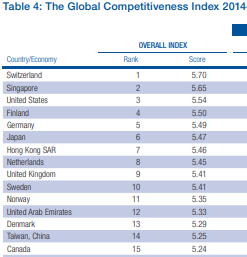The idea of this blog is a consequence of my discovery of the World Economic Forum (WEF) Global Competitiveness report. One day I found myself reading news, in some on-line newspaper, about the evolution of Spain, my country, in the global rankings. As I often do in these cases, I went to the source.
That was in the year 2015. Or maybe before. It does not matter.
Till then, I had understood competitiveness as something similar to this definition that I just found on the internet: “Competitiveness is the ability of a firm to offer, in relation to its competitors, products of higher value at equal or lower-cost and to build competitive positions that enable superior economic performance.”
In other words, it says that a company is competitive if it can sell good quality products at a lower price. Extrapolating this concept: a competitive country should be one which companies can sell the right products at a convenient price.

But the list was showing that the most competitive countries were not cheap producers.
- Switzerland
- Singapore
- United States
- Finland
- Germany
- ….
None of them is a country with underpaid people, weak institutions, poor education and low health. In 2014, the average gross salary in Switzerland (https://www.bfs.admin.ch/bfs/en/home/statistics/work-income/wages-income-employment-labour-costs/wage-levels-switzerland.html) was 6.189 CHF/month, equivalent with 7.489 €/month (1 CHF = 1.21 €). For the same year, the average gross salary in Spain (https://www.statista.com/statistics/419513/average-annual-wages-spain-y-on-y-in-euros/) was 2.367 €/month. How could be Switzerland more competitive than Spain (position 35) when average wages were 3,16 times higher? What about Germany? Weren’t German companies producing in Eastern Europe because they were competitive countries? In 2014 the average gross wage in Romania (position 59) was 527 €/month. Why wasn’t Romania on the very top of the most competitive countries when they can produce good quality with such low salaries? It is said that every car produced in Europe has at least some components, if not all, manufactured in Romania. There is no doubt about the quality of their production. They WHY?
The truth is that I was wrong in my understanding of what Competitiveness means.
The idea that something is competitive if it is cheap and has a good quality is maybe valid for products and services, but not for companies and countries unless you are thinking of buying them.
To be competitive is an internal quality. It is like being intelligent, a great football player or a right person. It is inherent to the person, product, company or country. As a quality that it is, it can be developed and improved with sometimes a lot of effort.
Let me give you an example: Most of us would not say that a cruel gangster is a right person because he/she sends part of the money he/she robs to the orphanage in town. Instead, we could probably say that the volunteer helping in the orphanage during his/her free time after honestly working and making an average salary is a good person. “Goodness” results from an overall correct behaviour in many areas of a person’s life; it takes into account many different factors. Probably the volunteer makes an effort to be good because he/she WANTS to help others. Who would you want to be close to, the gangster or the volunteer? If your answer is the gangster, you have a problem. In general, the volunteer is more wanted and is more competitive.
A low price qualitative product is competitive because all we can expect from it is to provide the service we need with proper results and at the lowest possible price. When we are saying that the company X is competitive because it sells the right products at a low cost, what we are saying is that THEIR PRODUCTS ARE COMPETITIVE, which is different to the company being competitive. When we say that a country is competitive because salaries are 500 €/month and can sell products of quality at a low price, we mean that THE PRODUCTS SOLD FROM THAT COUNTRY ARE COMPETITIVE, which is different to the country being competitive.
If you were living in your country and planned to emigrate, where would you instead go? To Germany (most typical gross salary 2019 3.657 €/monh) or Moldova (most typical gross salary 2019 around 461 €/month). Moldova has beautiful landscapes, amiable people and quality production of many products, among them great wine. Still, I am sure that most of you would choose Germany because the overall conditions might suit better your expectations for your future life. Germany (position 7 in 2019) is more competitive than Moldova (position 86 in 2019) because it is more wanted. And the reasons why it is more wanted is what the WEF Global Competitiveness report measures every year in detail. (source for most typical salaries https://www.averagesalarysurvey.com/)
Then, if it just a way of talking, a misconception, why don’t we just let it this way? Because the consequences of this misconception are very harmful to companies and countries. When the priority is selling cheap, all action will focus on decreasing costs as much as possible, including salaries. In the end, we will not have competitive companies and countries. We will have cheap companies and cheap countries.
To me, Competitiveness is the quality of being wanted despite the cost.





